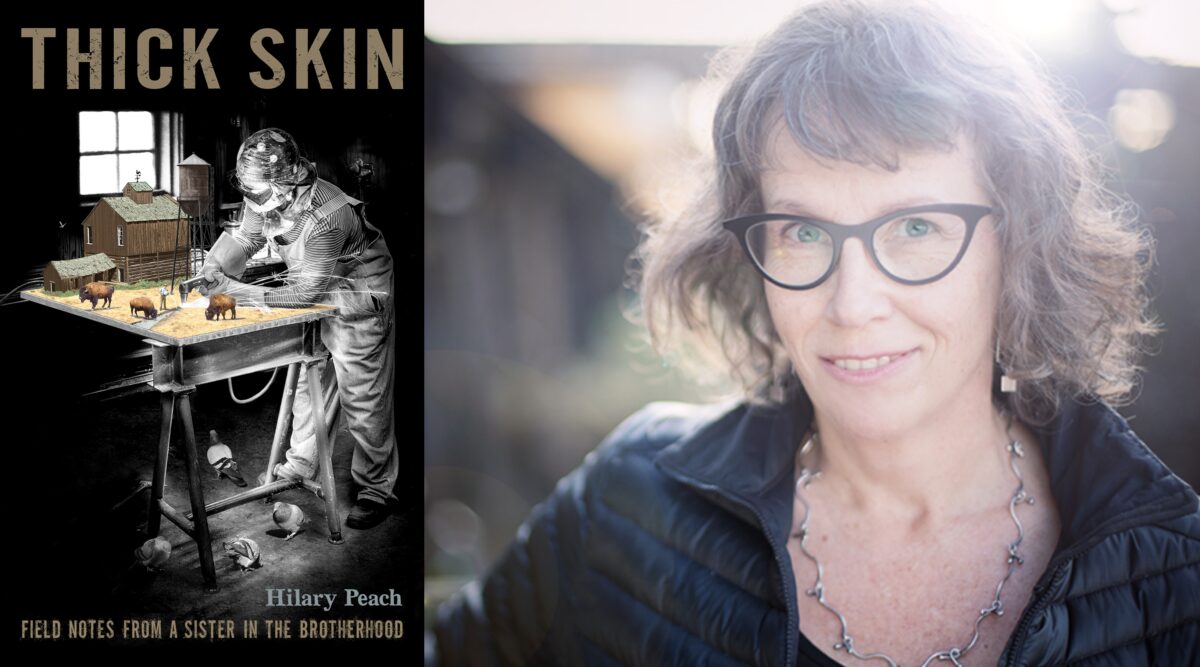Uncategorized
Oregon Tradeswomen Suffers Significant Loss Following Break-In
UPDATE – 10/31/2024 @ 5:00 pm
We are pleased to share an uplifting update on the situation. Thanks to the incredible outpouring of support from our community, Oregon Tradeswomen has everything we need to run our Winter Trades and Apprenticeship Career Class next week.
The generosity we’ve received has been nothing short of inspiring. From donations, to offers of equipment, each contribution has played a crucial role in helping us bounce back from this theft. Our staff, alongside our industry partners, have been working diligently to ensure that our newest cohort of students will have everything they need to embark on their journeys in the skilled trades.
We thank every person who shared our story and reached out to help, your efforts have paid off and we couldn’t be more grateful.
_____________________________________________________________________________
Over the weekend, Oregon Tradeswomen’s training facility suffered a break-in which resulted in the significant theft of tools and gear that are mission critical to deliver our BOLI-certified pre-apprenticeship program. The ramifications of this theft are considerable as the estimated cost to replace all of the stolen equipment is roughly $20,000. With the Winter Trades and Apprenticeship Career Class (TACC) ready to start training next week, the timing of this incident couldn’t be worse.
Training Manager Zoe Stansbury expressed how detrimental this theft is for the organization, stating, “This incident is a major setback for us. The tools and gear stolen are crucial to our pre-apprenticeship program, and with class set to start so soon, managing the impact of this theft has been immensely challenging.”
Despite this devastating loss, staff is working tirelessly with our industry partners to ensure the impact on the TACC program is at a minimum. Our Training Team has diligently identified the losses and put together a preliminary list of the most important tools and gear that are absolutely necessary to serve our newest cohort as they eagerly embark on their journeys into the skilled trades.
How the Community Can Help
Oregon Tradeswomen is reaching out for community support to help replace the stolen items and ensure the Winter TACC program can proceed without significant interruption. They have compiled a wish list of critical items that are essential for the program’s success.
You can help by:
- Purchasing Items: Check out Oregon Tradeswomen’s Home Depot Wishlist here to see what tools and gear are urgently needed.
- Making Financial Donations: If you prefer to contribute financially, you can make a donation through our website at oregontradeswomen.org/donate. Every dollar counts in helping to replace the stolen goods.
Donna Hammond, Oregon Tradeswomen’s Interim Executive Director, expressed her gratitude, saying, “Though this break-in is a painful reality, we are deeply grateful for the resilience and generosity of our community. Together, we can rebuild and continue providing life-changing training and support to women across Oregon.”
While the theft has posed a significant challenge, the spirit of community and solidarity that Oregon Tradeswomen has fostered over the years shines bright. Your support, whether through purchasing items from the wishlist or making a financial donation, can make a tremendous difference. Let’s come together to ensure that women and gender minorities continue to have the tools they need to succeed in the construction trades. Together, we can overcome this hurdle and keep building a brighter future.
Thick Skin: Field Notes from a Sister in the Brotherhood
With still relatively few women working in the skilled trades, we are always excited to hear about new media representing the experiences of tradeswomen.
We are excited to share a new publication from Canadian tradeswoman Hilary Peach, detailing her two decades as a transient welder in the Boilermakers Union! The book, Thick Skin: Field Notes from a Sister in the Brotherhood, is a collection of Hilary’s journal entries, notes, and observations from her time working in shipyards, pulp mills, power-stations, and other traditionally male worksites across the North American continent.
Hilary’s stories take you on a journey through the lens of being the only woman welder on a job-site. Her mastery of the written word paints a beautiful picture of the dichotomy between the challenging nature of her work and the rewarding feelings of a job well done. Hilary confronts the blatant sexism and discrimination in the industry with humor, lending levity to tough topics that are still too common in the tradeswoman experience.
The British Columbia Review describes Thick Skin as “a vital memoir and, as poet Kate Braid reveals in her preface, it’s also a ‘love story.’ Hilary Peach takes the reader into a rarely seen world and we leave with new knowledge and respect, her style sparking as brightly as a welder’s torch, seaming disparate pieces of the universe together.”
Canadian poet Kate Braid says of the memoir, “This is a wonderful book – not just funny but a rare, insider’s look at the life of a travelling welder – the good, the bad, the ugly, and always, the fascinating. A collection of hilarious stories by a master (mistress?) of repartee, it is also an homage to the trade she loved.”
The New York Labor History Association, Inc. thanks Hilary for “making women look good out there and for paving the way for more women to enter this industry.”
You can purchase Thick Skin: Field Notes from a Sister in the Brotherhood directly from Small Press Distribution, a non-profit literary book distributer, or on Amazon!
UPDATE (7/12/2023): Join Oregon Tradeswomen at 454 SE 187th Ave, Portland, OR, on August 10th at 6:00 pm for a book reading and Q&A with the author!
RSVP and Join the Event on Facebook!
Oregon Tradeswomen’s First Laborer-Focused Rural Pre-Apprenticeship Class!
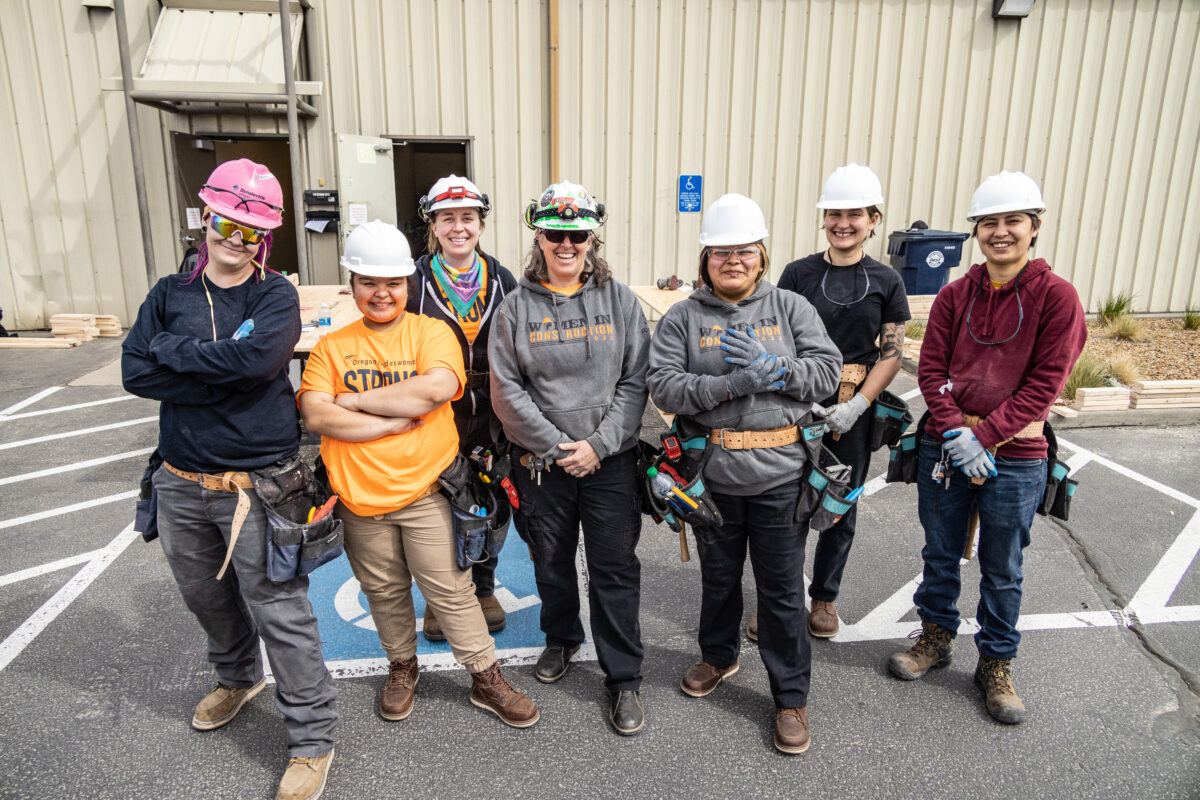
Oregon Tradeswomen is a Portland-based non-profit organization, but it has been our goal to expand our pre-apprenticeship training and services across the state of Oregon. This year, we got closer to that goal! We worked with the Oregon Laborers Training and Apprenticeship, with funding through our contract with the State Apprenticeship Expansion Grant, to pilot a rural training program to recruit more women and non-binary folks into the Construction Craft Laborer trade!
Like Oregon Tradeswomen’s primary 8-week Trades and Apprenticeship Career Class (TACC), the Laborer’s Rural TACC is a 192 hour BOLI-Certified pre-apprenticeship, but was condensed into 5-weeks with a focus on the Laborer trade. Pre-apprentices spent the first few weeks building a foundation of skills through tool assessments, fitness conditioning, and construction math. Then, in Week Three, the Oregon Laborers led a Laborer’s boot camp where class participants applied their new construction skills on hands-on projects such as framing then deconstructing an 8′ x 8′ wall.
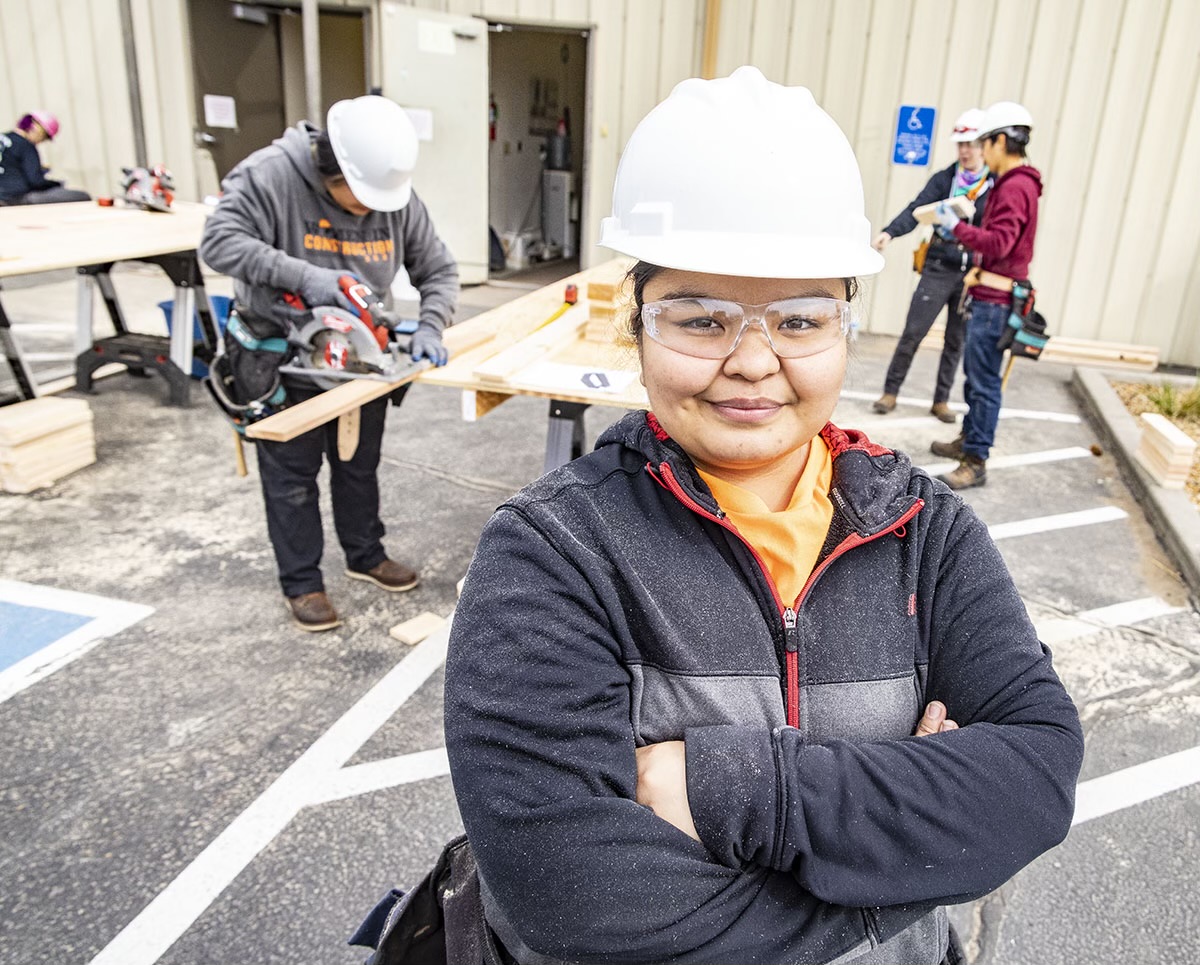
Hands-on training continued through the end of the program with students working on projects like building benches for the Warm Springs Reservation assisted living facility: the High Lookee Lodge! With several participants belonging to the Warm Springs community, there was a profound sense of pride in using their new skills to give back. In fact, one participant shared that her goal in pursuing a career in the trades was not only to provide for her children and two teenage siblings, but to bring her expertise back to Warm Springs and make much needed improvements to the infrastructure there.
By the end of the 5-week program, all participants graduated, not only as BOLI-certified pre-apprentices, but with OSHA 10, CPR, First Aid, and Forklift Certifications. A certification in Green Construction is also available to interested graduates through a two-day training with our partners at Earth Advantage. The most unique element of this training is that program graduates are offered direct entry to the Oregon Laborer’s Apprenticeship program as well as immediate employment to bridge the gap between graduation and starting Apprenticeship.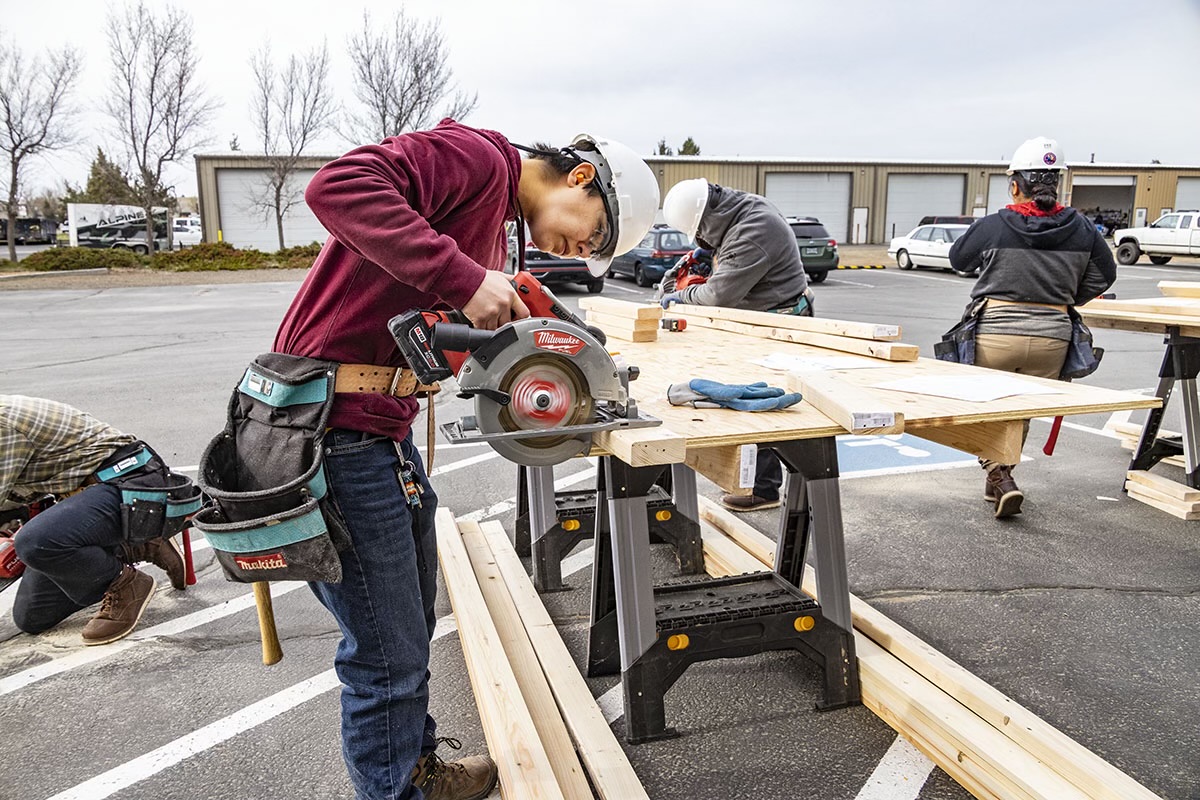
When reflecting on the past 5 weeks, Oregon Tradeswomen Training Coordinators Carol Murray and Kate Hibbs expressed their pride in the achievements of each graduate. “Seeing pre-apprentices find out that they are good at something on the first try is just so rewarding,” Kate shared. “Those little successes build on each other and create confidence for everything that follows.” Carol was particularly inspired by the level of camaraderie fostered among the students. “They’re helping one another, they’ve got each other’s backs, they’re checking in if someone is late,” she explains. “The way they connect with one another before they go out into the field is vital.”
We weren’t the only ones impressed with the Redmond pre-apprentices! This cohort had a few very special visitors join them throughout the 5 weeks. First, Oregon Governor hopeful, Tina Kotek, stopped by to learn more about the importance of pre-apprenticeship and how programs like TACC break down barriers for women to enter and be successful in the skilled construction trades. Then, we had Robert Camarillo, Wayne Chow, and John Mohlis of the Oregon State Building & Construction Trades Council stop by to say hello to our training team and see the trainees in action! It is always a treat to have such influential visitors come to see the great work being done by our pre-apprentices.
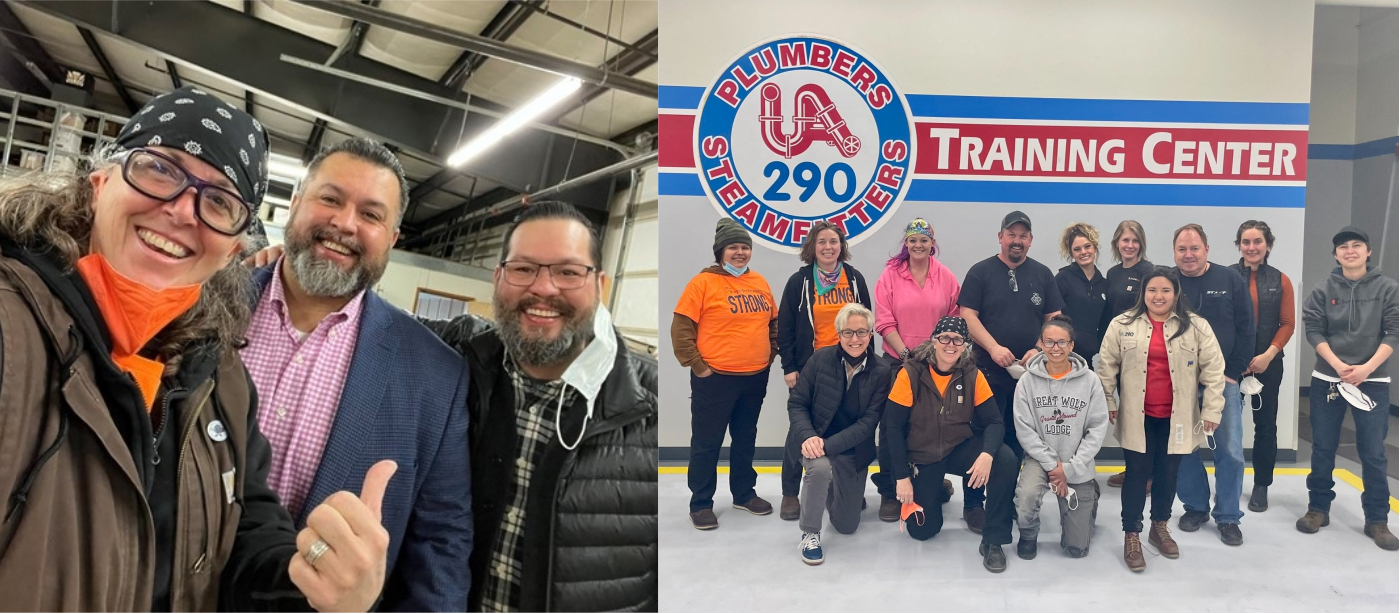
Not only are our pre-apprentices developing valuable job skills for a bright future, but Redmond graduate Sage Flowers was given an incredible opportunity to tell her story at the Democratic Party of Oregon Summit. At the Summit, Sage joined a panel about growing Oregon’s economy through infrastructure investment, partnerships, and registered apprenticeships where she spoke from personal experience about how policy efforts to expand training and apprenticeship opportunities directly impact the lives of women in her community. Rural communities often lack access to career exploration and training programs that lead to family-supporting wages. Through this partnership between Oregon Tradeswomen and the Oregon Laborer’s Training and Apprenticeship, we are working to bring more career education and trainings to the communities that need them. With proper funding and policy, training opportunities for rural communities can expand further across the state.
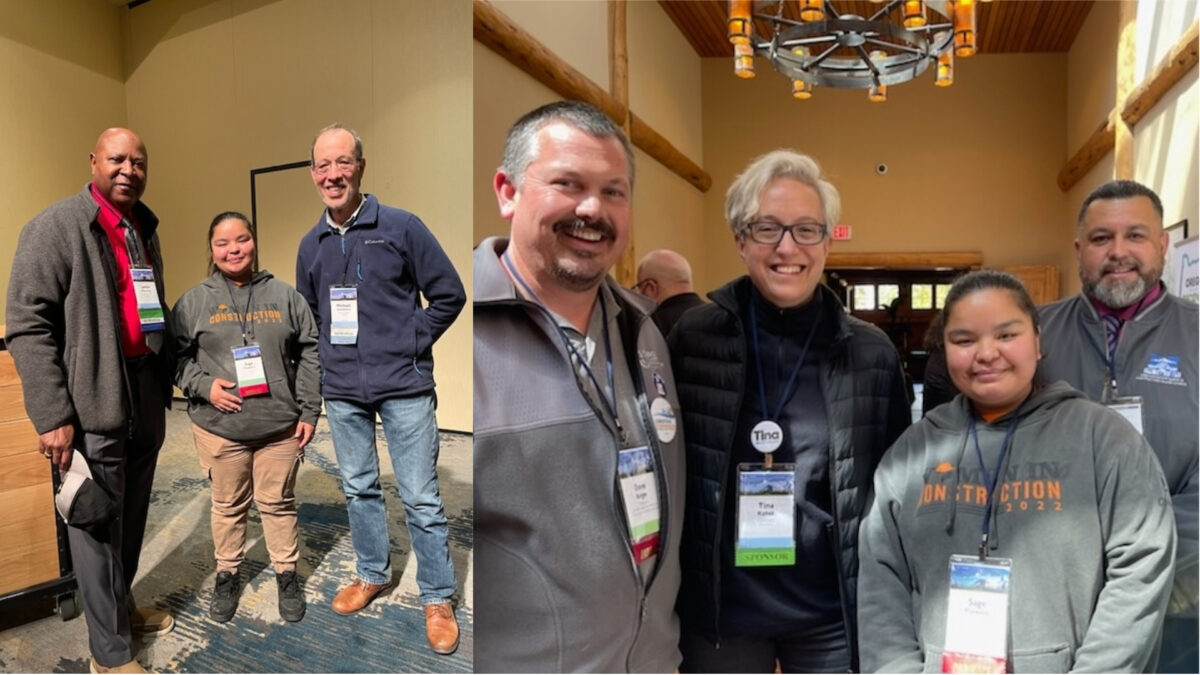
Now that our Redmond pre-apprentices have graduated, we know they have bright futures in the trades. These 6 hard workers gave their all to commit their time and energy to complete our 192-hour program in just 5 weeks! We have so much gratitude for UA Local 290 for hosting us in their training facility, the Oregon Laborer’s Training and Apprenticeship for partnering to deliver this training, as well as COIC Worksource and East Cascade Works for providing supportive services (and a fantastic video about our training!). Additionally, we thank the Warm Springs Tribal Employment Rights Office for recruiting community members for this training. Special thanks to our friends Dave Burger, UA Local 290, and Taunia Blakely, IBEW Local 280, who were key in this project coming together.
It really does take a village to change lives and we are so proud of this community for stepping up to the plate to help make this rural training a success. We cannot wait to get back to Central Oregon and help more women get on the path to a fulfilling career in the trades!
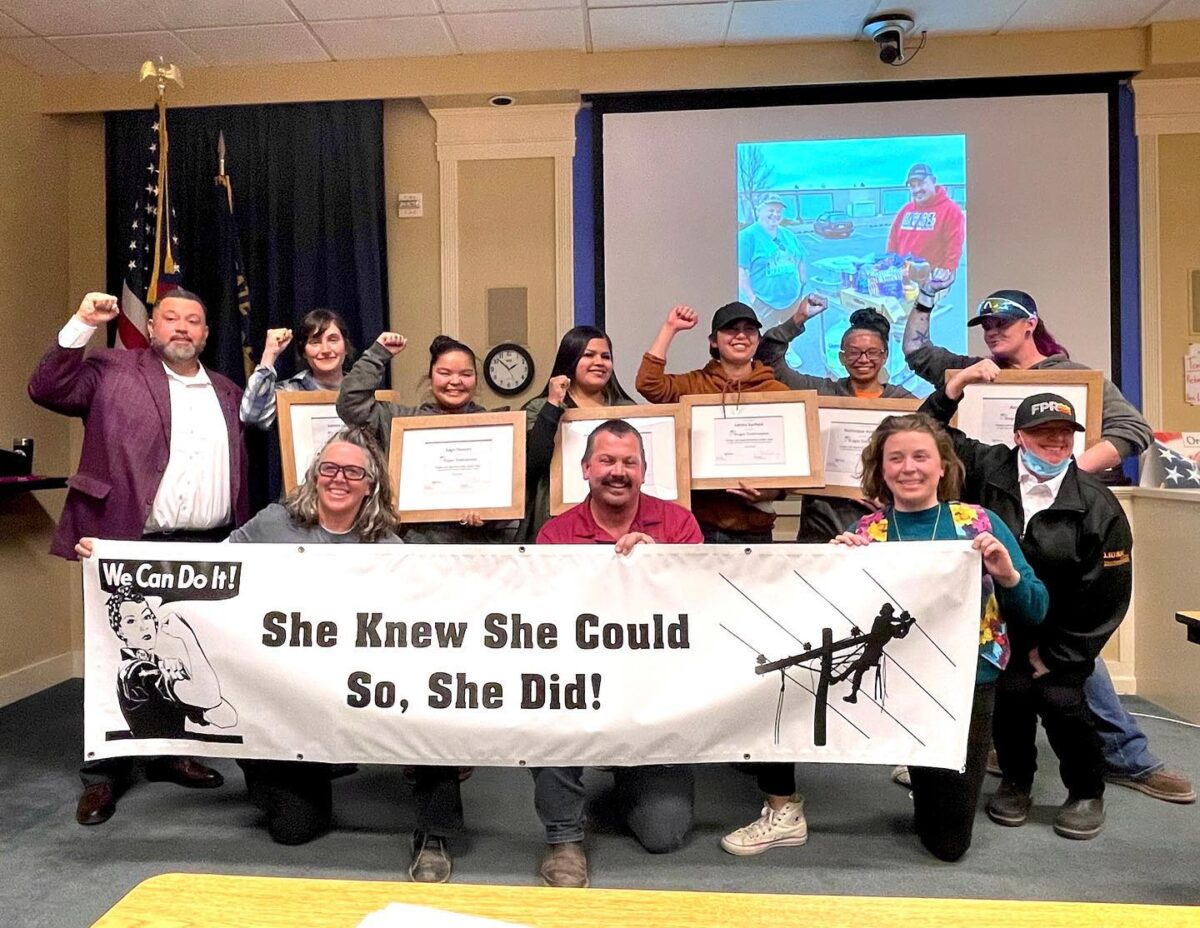
Women’s History Month 2021
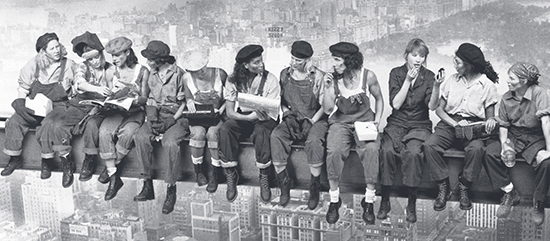
Oregon Tradeswomen celebrates and honor the many contributions of women every day, and especially during Women’s History Month and on International Women’s Day, we pause to acknowledge the trailblazing work of women and girls who have pushed to change our nation and our world for the better.
We recognize the women and girls who, despite the barriers and roadblocks of discrimination, courageously and bravely fought for, and continue to fight for:
- paid family leave and sick leave
- quality, affordable childcare
- wage equity and benefits
- eliminating gender-based violence and jobsite harassment
- and so much more.
Women and girls who, through persistence and commitment, stand strong in the demands for justice, dignity, and equality.
We celebrate and honor our sisters throughout history and those making history today – especially Black women, Indigenous women, Immigrant women, Trans women, and others from diverse communities are on the front lines of our communities working for a better world for all of us each and every day.
These inspiring, powerful, and passionate women are champions for change, including our sisters in the Tradeswomen Movement. In our recent history, these sisters who paved the way for other women and girls and continue to break the “concrete ceiling” in the construction industry, making the industry better for ALL workers.
Women like:
Portland’s own Donna Hammond, Business Representative at IBEW Local 48 who was one of the first women accepted into the IBEW/NECA apprenticeship program back in 1978 and who is a tireless champion for equity and inclusion in our industry.
Evelyn Shapiro, the first female Executive Secretary-Treasurer to lead the United Brotherhood of Carpenters regional council in the United States and who is leading diversity and equity efforts in her union.
Adrienne Bennett, the first black female master plumber in the U.S. who is now CEO of her own contracting company, Detroit-based Benkari LLC.
Judaline Cassidy, one of the first women to be accepted into Plumbers Local 371 in Staten Island, NY, and the first woman elected to the Examining Board of Plumbers Local No. 1 and founded Tools & Tiaras to inspire girls to be empowered by the trades.
Carolyn Williams, one of the first women to complete Atlanta IBEW Local 613’s apprenticeship program as a journeyman inside wireman and the local’s first woman and person of color to serve as an assistant business manager.
Vicki O’Leary, who at age 21, became an ironworker in Chicago and later went on to become the International union’s General Organizer for Safety and Diversity, where she led the effort for paid maternity leave – the first in the nation’s building trades union, and where she was instrumental in creating “Be That One Guy“, a program to fight jobsite sexual and other harassment.
Pat Williams, trailblazing feminist, and LGBT activist in blue collar trades in Southern California who was one of the first women to enter the Operating Engineers apprenticeship program in Los Angeles in 1979 and later became a District Representative and Vice President of IUOE Local 501. Pat supports the Tradeswomen Memorial Project at the Long Beach Rosie the Riveter Park and is a co-founder, along with Jamie McMillan, union ironworker of KICKASS Careers.
Sue Doro, creator, and editor of Pride and a Paycheck, the only publication dedicated to tradeswomen and the Tradeswomen Movement. Sisters like Molly Martin, Dr. Vivian Price, Dr. Lynn Shaw, and Jane Templin who created the Tradeswomen Archives Project to document and keep the history of tradeswomen’s contributions alive. Susan Eisenberg, retired IBEW member who became one of the first women in the United States to become a licensed union journey-worker electrician who, for over four decades has advanced issues of tradeswomen through such seminal works as “We’ll Call You If We Need You: Experiences of Women Working Construction”, which brought the issues of discrimination and exclusion that tradeswomen face daily in the industry.
These women, and so many others, continue to change not only our industry, but our world, for the better. Join us in applauding them, honoring them, and celebrating them.
Join us in acknowledging women’s achievements, raising awareness against bias, and taking action for equality as we continue to work together to forge a better world.
In strength and solidarity,
Kelly Kupcak

Construction Careers Education and Career Pathways Navigation Program
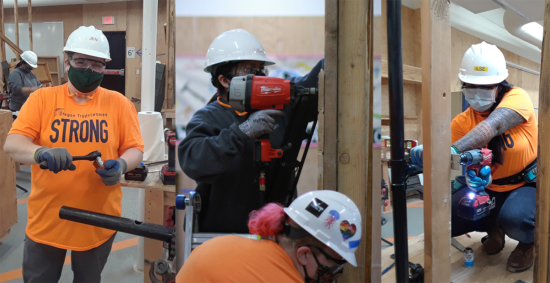
Like many nonprofits during this tumultuous year, Oregon Tradeswomen was challenged to shift our training, programming, and services in this time of social distancing due to COVID while still meeting the needs of our community, our industry, and the many women looking to start careers in the skilled construction trades.
Our team turned the challenge into an opportunity to build something bigger, and better, and our updated program and service offerings in 2021 means more women will have access to our training and expanded resources and support, including:
- Women outside the Portland Metropolitan region
- Women in rural communities
- Women living on Tribal Lands
- Women serving as caretakers during COVID restrictions
- And many others
In 2021, Oregon Tradeswomen will launch our re-envisioned Construction Careers Education Sessions and will provide additional information, resources, and support to women seeking to enter the skilled construction trades.
We will offer monthly webinars where jobseekers can learn about the many exciting and dynamic opportunities in the skilled trades, learn how to navigate the nuances of registered apprenticeship, the construction industry, and navigate a successful career in the industry.
Whether someone needs more skills, has some experience and needs help putting together a trades resume and preparing for an interview, or needs a bit more support before starting an apprenticeship-readiness program, our Construction Careers Education and Career Pathways Navigation Program team will be there to help.
Stay tuned for a schedule of events coming in January 2021! We look forward to putting more women to work!
Labor Day Message from Oregon Tradeswomen’s Executive Director
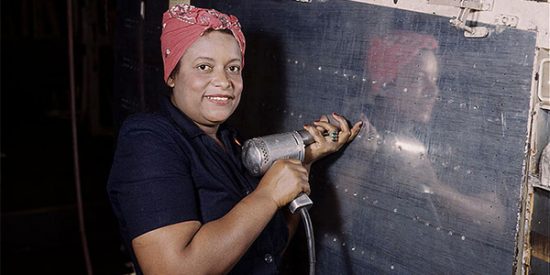
Original photo by Alfred T. Palmer – Image credit to United States Library of Congress
The first Labor Day in the United States was celebrated in 1882, almost two decades before women had the right to vote and before the U.S. Department of Labor recognized the contributions of women to the Labor Movement by creating the Women’s Bureau. Nevertheless, women contributed to the Labor Movement before it was even called a movement.
Women like:
Mary Harris “Mother” Jones, who was once called the “most dangerous woman in America”, fought to protect child workers and push for enforcement of child labor laws. She became an organizer for the United Mine Workers and stood up to big companies and organized coal miners to demand better conditions for workers.
Velma Hopkins, an African-American organizer with Local 22 of the Food, Tobacco, Agricultural, and Allied Workers of America-CIO. She mobilized 10,000 workers in North Carolina to unionize R.J. Reynolds Tobacco Company.
Dolores Clara Fernández Huerta, a labor leader and civil rights activist who, with Cesar Chavez, co-founded the National Farmworkers Association, which later became the United Farm Workers. She was tireless in her fight for worker rights, immigrant rights, and women’s rights.
Frances Perkins who, having personally witnessed workers jump to their death during the Triangle Shirtwaist fire, helped to pass strong labor laws after becoming the first woman appointed to the U.S. Cabinet as Secretary of Labor in 1933.
Ai-Jen Poo who worked to organize domestic workers in 2000, and was key in the passage of the Domestic Workers Bill of Rights in New York. The bill legitimated domestic workers and gave them the same lawful rights as other employees, such as vacation time, and overtime pay.
Hattie Canty, the legendary African-American unionist was one of the greatest strike leaders in U.S. history. After her husband died, she raised eight children on her own and dedicated her life to improving the working conditions of others. She fought for a living wage and for the engagement of People of Color in the Labor movement. Her patient leadership helped knit together a labor union made up of members from 84 different nations!
The women noted here are just a few of the very many who made sacrifices for worker’s rights.
As we mark the 100th anniversary of the creation of the U.S. Women’s Bureau, Oregon Tradeswomen would like to honor them, and all who have fought and continue to fight for our nation’s workforce.
Oregon Tradeswomen is grateful for our partners in the Labor Movement, here in Oregon and across the country who work tirelessly for worker’s rights, dignity, and justice. We are with you in the fight today, and always, as today we honor our nation’s workers!

Kelly Kupcak, Executive Director
Oregon Tradeswomen
Hammer and a Helping Hand
Oregon Tradeswomen rang in the New Year setting up our new home in the Rockwood neighborhood, a feat accomplished with the help of our generous supporters. To say thank you, we are shining a light on some of our business partners who made this move possible. Starting with our friends at Hammer & Hand, a local general contractor started by two Reed College graduates, Sam Hagerman and Daniel Thomas, who began their carpentry careers by remodeling historic Portland homes. Hammer & Hand has since expanded to include new home-building, commercial construction, handmade windows and doors, and executing traditional and modern designs created by the Pacific Northwest’s top architectural firms.
Because the founders developed their skills as carpenters through remodeling beautiful historic buildings, they are guided by an ethic of quality, durability, and beauty in all of their projects. Hammer & Hand has made a name for themself as a national leader in high-performance and quality-assured durability having authored two editions of their Best Practices Manual, a compendium of their field-tested construction details, many informed by their experience in high-performance passive building. A third edition of this guidebook is slated for this summer.
Hammer & Hand is a company of carpenters, and they don’t operate like a typical single-source “design-build” firm. Instead, their process involves partnering with an independent architect and getting the design team, the general contractor, and client together in a dynamic collaborative process that ensures a well-rounded approach to the project to satisfy budget, aesthetics, and buildability. Hammer & Hand’s goal is to makes each clients’ dreams a reality while building to last.
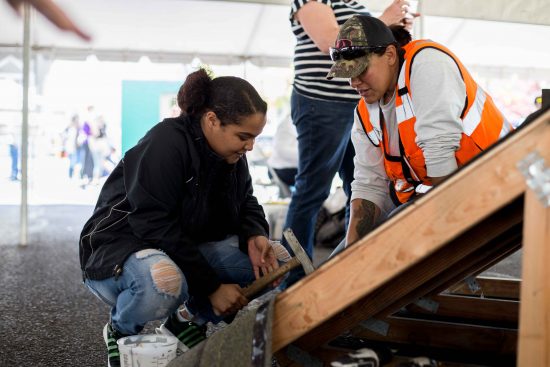
Their commitment to great work doesn’t end here. Hammer & Hand is dedicated to empowering their employees. Because of their commitment to workforce happiness, Hammer & Hand sees very little employee turnover and has team members who have been with the company for a long time, including career carpenters who have celebrated 15 and 20 year anniversaries over the past few years. Hammer & Hand is also committed to workplace diversity and actively hires women – including a few Oregon Tradeswomen graduates!
Hammer & Hand demonstrates their commitment to Oregon Tradeswomen’s mission not only by giving our graduates an exceptional place to grow in their careers as carpenters, but they made an incredibly generous donation to helping us acquire a training space of our own. Oregon Tradeswomen’s new headquarters in Rockwood, complete with classroom and workshop, allows us the capacity to expand our training to serve more women in more ways. We are grateful for Hammer & Hand’s investment in our growth as an organization and we look forward to the bright future we are building together.
Tradeswomen Leadership Institute 2019
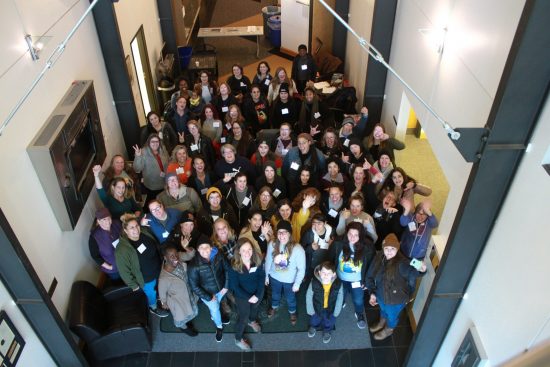
On December 7, 2019, Oregon Tradeswomen held our annual Tradeswomen Leadership Institute (TLI) at the Sheet Metal Institute here in Portland, Oregon. The event drew more than 50 participants from a diverse spectrum of trades! We were thrilled to see such a successful showing of trade workers from our community and across our industry.
The event was organized in part by an advisory committee of tradeswomen who shared ideas and insights which informed the workshop content, including topics such as Surviving and Thriving in the Trades and Advancing Your Career from the Jobsite into Management. Workshops also provided resources on how to access financial supports and plan for retirement, as well as how to politically advocate for yourself and other tradeswomen.
Our Keynote speaker, Sonia Ramirez, Wage and Hour Administrator for the Oregon Bureau of Labor and Industries, wrapped up the day with a passionate speech about her professional journey, and her path to leadership as a woman of color in a male dominated industry. Sonia inspired the whole room! We were also surprised and delighted to see Oregon Labor Commissioner Val Hoyle, who stopped by to show her support for the event as well.
Oregon Tradeswomen wants to thank the TLI Advisory Committee for their wisdom, enthusiasm, and superb ideas which made TLI 2019 so successful and well attended. Special thanks to the Sheet Metal Training Center Local 16 for hosting us for the day. We extend our gratitude to the speakers who shared their valuable time and advice with us, as well as our dedicated community partners and staff who helped make the event a success.
Check out photos from the event on Facebook!
We look forward to seeing you in 2020!
Metro Adopts The Construction Career Pathways Framework
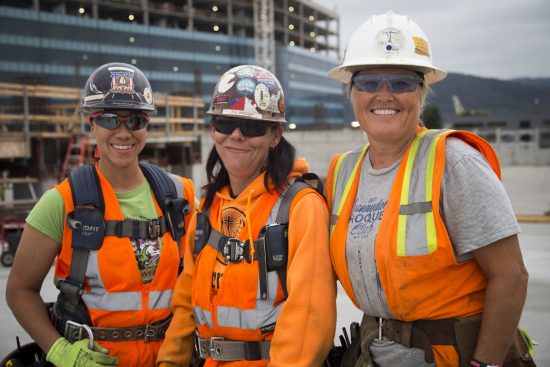
In 2018, Metro regional government released a labor market study for the construction industry and the potential economic impact for our region’s workforce. Greater Portland is growing and the construction industry is growing with it. There is an anticipated need for 15,000 new construction jobs in the next 10 years at a time when 20 percent of the region’s workforce is nearing retirement age.
While construction has historically had a male-dominated and racially homogenous workforce, our industry is changing due to intentional efforts such as those spearheaded by Metro’s Construction Careers Pathways Project (also known as C2P2). As industry continues to report a continued shortage of skilled workforce talent, there is an opportunity to tap into existing resources to increase the number of women and people of color that make up a skilled, qualified and diverse workforce pipeline.
Through Metro’s initiative in bringing together public owners to build a regional model of diversity, equity, and inclusion in construction contracting, procurement, and workforce, we have an opportunity to create a shared prosperity model. Construction is one of the few industries still offers a family-sustaining career, with wages averaging $35 per hour and full benefits. Through access to good careers with good wages and benefits, we can create financial stability for our regional workforce, which can be life changing.
Diversifying the construction workforce not only directly addresses the labor shortage; it directly addresses issues of poverty and economic mobility within communities of color and working families in the region. Nationally, women make up only three percent of the skilled trades in the construction industry, and people of color make up nineteen percent nationwide. In Oregon, women comprise just under eight percent of the skilled trades, with minorities accounting for twenty percent statewide in the industry.
Without a pathway to financial independence and stability, women can become limited in their choices, in their personal safety, and in their long-term health and well-being. Lack of access to well-paid job opportunities is one reason poverty rates for women are substantially higher than those for men—here in Oregon, almost a third of households headed by single women live below the self-sufficiency standard according to the 2017 report, Count Her In, by the Women’s Foundation of Oregon. For women of color in Oregon, the situation is even direr as 86% of Black and Latino female-headed households with children do not have sufficient income to meet their basic needs.
The report notes that improving educational outcomes for Oregon’s women will not solve this problem as the earnings gap for women actually widens with more educational attainment. Because Oregon’s female workforce is concentrated in low-wage occupations, in fact 60% of all minimum wage workers in Oregon are women, connecting women to construction careers can mean economic stability for a significant percentage of our families.
This is why Oregon Tradeswomen joined with a host of other organizations across the region in support of Metro’s C2P2 model, working with public agencies, labor unions, workforce development organizations, and contractors, to leverage capital investments to grow and diversify the region’s workforce. By recruiting and supporting women and people of color in the skilled trades, we strengthen our construction workforce for decades to come while at the same time, creating needed financial stability for families and communities through this shared prosperity model.
As we make progress toward these shared goals, our region’s economy will be stronger and more equitable.
Wire a Light 2020 Dates Announcement
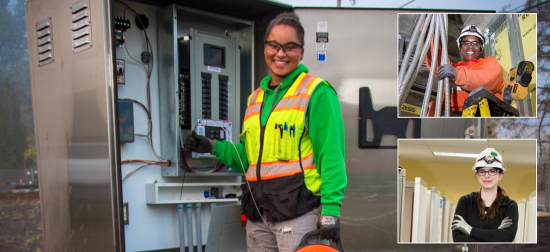
Would you like to learn about the possibilities a career as an electrician offers? The NECA-IBEW Electrical Training Center is hosting SIX “Wire a Light” workshops for women who have an interest in the electrical trades. During this free workshop, you can learn how to wire a light, meet women electricians in the industry, and find out how to start your career as an electrician.
Dates & Registration:
February 6, 2020
6:00 pm – 8:00 pm
Register for the 2/6 workshop
April 2, 2020
6:00 pm – 8:00 pm
Register for the 4/2 workshop
June 4, 2020
6:00 pm – 8:00 pm
Register for the 6/4 workshop
August 10, 2020
6:00 pm – 8:00 pm
Register for the 8/10 workshop
October 1, 2020
6:00 pm – 8:00 pm
Register for the 10/1 workshop
December 3, 2020
6:00 pm – 8:00 pm
Register for the 12/3 workshop
Location:
NECA-IBEW Electrical Training Center
16021 NE Airport Way
Bus Lines:
NECA-IBEW Electrical Training Center is accessible via TriMet bus lines 74 and 87.

